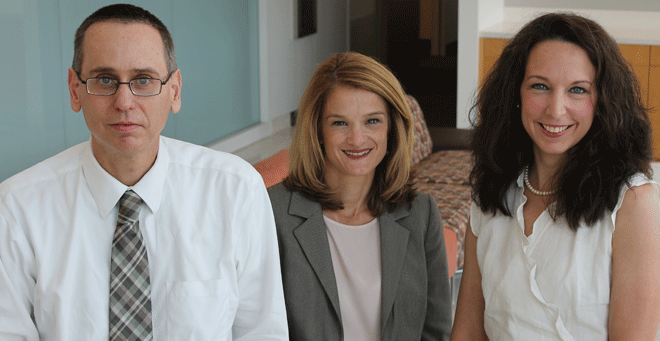 |
|
| From left are, Jeroan Allison, MD, Nancy Byatt, DO, and Tiffany Moore Simas, MD. |
UMass Medical School has developed an innovative program to reach more women with perinatal depression by empowering obstetricians to treat patients’ psychiatric needs in their own practices. Now, with a first-of-its-kind, $2.5 million grant from the U.S. Centers for Disease Control (CDC), investigators at UMMS will test the new approach as a potential national model to address the urgent public health problem of depression during and after pregnancy.
“Our pilot work suggests that our approach is feasible in ob/gyn settings and targets multiple gaps in treatment to ensure the patients’ depression improves,” said perinatal psychiatrist and principal investigator Nancy Byatt, DO, assistant professor of psychiatry and obstetrics & gynecology. “We will integrate depression in obstetrical care in every way possible. We will also proactively monitor and engage all depressed patients in the clinic to ensure that they initiate treatment, receive adequate treatment and respond to treatment.”
With depression affecting one in seven women in pregnancy and the postpartum period, and limited psychiatric resources for treatment, UMMS will use the five-year grant from the CDC to compare the Rapid Access to Perinatal Psychiatric care in Depression Program (RAPPID), the enhanced intervention, with the existing Massachusetts state-funded MCPAP for Moms program. MCPAP for Moms, which Dr. Byatt spearheaded and for which she serves as medical director, provides ob/gyn practices with education and tools about best practices, and immediate telephone consultation with a psychiatrist for guidance. The enhanced and expanded approach, which builds on MCPAP for Moms, has the potential to become a national model for improving treatment and outcomes for women who suffer from perinatal depression.
“The nice thing about caring for women during pregnancy and postpartum is you’re not just treating mom, you’re treating multiple generations by treating mom,” said co-principal investigator Tiffany Moore Simas, MD, the Joy McCann Professor for Women in Medicine and associate professor of obstetrics & gynecology and pediatrics. “The intergenerational effect is compelling.”
In addition to the obstetrician’s perspective, Dr. Moore Simas brings to the research team her experience recruiting for clinical trials at both the obstetrical clinic and provider level and the individual patient level.
“Doctors are very busy and pressed and need help to deal with this serious problem. Stepped care means women get the care they need in the appropriate setting,” said primary care physician Jeroan Allison, MD, who is also a grant co-principal investigator. “We are bringing resources to physicians to help them better take care of their patients.” Dr. Allison, vice chair and professor of quantitative health sciences, professor of medicine and associate provost for health disparities research, brings to the CDC project extensive experience in designing and implementing cluster randomized trials.
“Our new stepped care model will help eliminate barriers and close gaps in care,” said Byatt.
Related links on UMassMedNow:
WCVB-TV: New mothers getting help for postpartum depression through new state program led by UMMS
More help on the way for Mass. women with depression during and after pregnancy
Byatt to Telegram & Gazette: postpartum depression can interfere with mother-child bond: Statewide initiatives will expand access to mental health services for new mothers